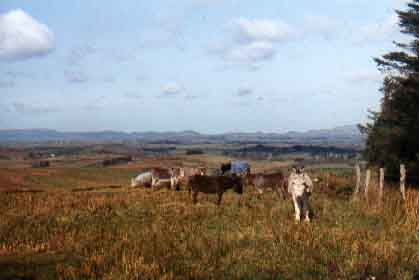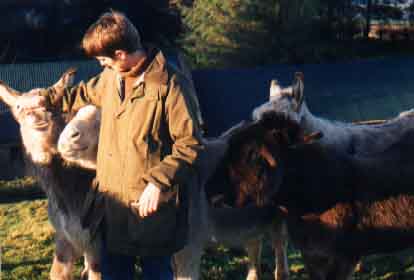Newsletter Spring 1995

The donkeys welcome their New Zealand rugs, even though it is getting warmer.
Looking back over old newsletters it seems the opening comments are always about the weather
This one is no exception as after the longest, wettest, most miserable winter this part of Ireland has known for some years (I thought last winter was wet), recording more than 200% increase in rainfall, the weather has been uppermost in most of our minds in the continued battle to keep donkeys warm and dry. Thanks to your wonderful support which enabled us to purchase waterproof New Zealand rugs for all the donkeys, they have come through in pretty good shape. The rugs have been severely tested and approved to the extent that as we began removing them during warmer days recently we were positively asked to put them back on for the chilly nights. Only during these last few days of much milder, dry weather have all the donkeys agreed to discard them altogether.
Tomas, Susie, Cassie and Solomon have all had their share of foot problems which can be attributed to several reasons. Primarily, foot infections are due to standing around in wet, acid conditions. The acid soil erodes the hoof wall often making sizeable holes which are perfect for trapping mud, manure and small stones. (These holes need to be thoroughly cleaned out, washed in salted water and treated by dripping iodine as deep into them as possible). In the donkey houses we were torn between providing deep litter bedding for comfort and warmth but which heated up thereby promoting growth of the foot rot bacteria, or keeping a dry, clean but necessarily much less luxurious bed which is better for the hooves but not as warm or comfortable. In the end we compromised and bought three 'cow mats' such as are used for cattle kept in slatted sheds. These are made of hard rubber which is easy to clean, quick to dry, firm to stand on and warmer to lie on than bare concrete floors. We tried these out in one of the smaller sheds, supplemented with an area of thick clean bedding straw and have been very pleased with the results. Given the choice the donkeys still prefer to lie on the straw but the mats have proved an acceptable second best. Winter laminitis can also be a problem as some donkeys have a very low grain tolerance level. Those that are housed for longish spells do usually have a small amount of barley or foal mix but feeding has to be carefully monitored. Cassie, for instance, only has to look at a cereal bag to have laminitis whereas Jacob can eat away to his heart's content with no ill effects and would have you believe that a dustbin full of grain a day is quite normal. I can assure you it is not! A couple of handfuls is more than enough for most donkeys.
Water Works
Our problems this winter have been exacerbated by the building of a new water reservoir by our local water scheme. This is situated at the highest corner of where Sanctuary land meets with two neighbours. The project has also entailed the renewal and replacement of all existing water pipes with unavoidable damage to land already saturated by heavy rainfall. At one stage there were three diggers, a JCB, a dumper truck and several tractors all working in the vicinity in conditions appalling for both men and machines, let alone donkeys. Visitors to the Sanctuary during these three months deserve a special mention for their tolerance and perseverance in ploughing their way through almost un-navigable roads. Thank you to all these stalwarts. The work is about completed now and a wonderful repair job has been made. Already areas which were totally out of bounds are beginning to dry up. Grass has been reseeded and now we have to wait with patience and reverence for Mother Nature to complete the task.
Tree Planting
Our planned winter shelter belt tree planting has been severely handicapped by the activities of the water scheme but we have, nevertheless, stuck in (literally) loads of willow and hazel cuttings to fill in the damaged gaps and are hopeful that most will grow. Meanwhile the nursery of saplings will gain another year's growth in the shelter of the garden. Provided summer plans to extend the shelter belt fencing go according to plan, we should be able to move out some little trees next October/November.
Wet cold and miserable though these conditions have been, our donkeys have been blessed with shelter and regular meals which is not the case for hundreds of animals who have had to endure the winter sometimes standing up to their knees in mud.
Fergal
Late in February a passing motorist reported seeing a small grey/brown donkey standing humped back in a field, head down, ears flat, doing its best to withstand a biting wind and lashing rain. There appeared to be no shelter in the field and closer inspection revealed that the little fellow had scraped out a bit of a hole in the hedge bottom in which he lay for the best part of his time, gaining what meagre shelter it afforded. His feet were grossly overgrown having curled under as well as out: they were painful, infected and very smelly. Heavy snowfalls prevented us from collecting him immediately but fortunately a kindly person nearby provided him with hay and water until with the help of our farrier who trimmed his feet on the spot so he could, at least, walk to the trailer, and Mick Keane of the ISPCA, who authorised his movement, we were able to bring him to Sanctuary. He travelled without mishap despite being very nervous but was obviously relieved when finally delivered to a bed of warm straw, a good meal and the comforting smell of other donkeys in the vicinity.
Next morning he was wormed and washed with a solution of Tixol as he was heavily infested with lice and mange mites. Large areas of his coat had fallen out so he was practically bare over his shoulders and rib cage, offering virtually no protection against the weather. Now, five weeks on, he is starting to respond to loads of TLC, is growing a new coat and has put on enough weight to look healthy and strong. It always amazes me how resilient these animals are and how quickly they recover when given half a chance. Unfortunately for us, Fergal, as he has become known, will eventually move down to the Liscarroll Sanctuary as we are already overstretched on the land we have. There will be lumps in several throats the day Paddy Barrett's donkey box arrives to collect him - he will be greatly missed.
Don't Hesitate
Fergal probably owes his life to the conscientiousness of the motorist who had the compassion to take time and trouble to report the donkey's plight, so giving us the opportunity to call on the proper authorities. So PLEASE, if you see or hear of a donkey you think may be in distress, either let us know, telephone The Donkey Sanctuary at Liscarroll (022) 48398, or inform the Gardai and ISPCA inspectors. All calls are treated in confidence: we just need to know precisely where the donkey is and any possible clues to ownership that you may have gleaned, which could help us to help the donkey.

Another visitor to cuddle!
Operation Ashtar
The trips to Dublin University Veterinary Hospital with Ashtar and a neighbour's pony rig both proved successful. We were met with courtesy and efficiency. Ashtar, in particular, was treated as a celebrity as donkey patients are unusual. He's an endearing little soul at the best of times and knew exactly how best to promote himself to get the best attention and the most cuddles of any animal seen that day! We find that administrating the homoeopathic remedy ARNlCA both before and after operations helps enormously in keeping down swelling and bruising but this is not to take away from the splendid job done by the University vets and students.
Our Thanks to All
As usual there is a sizeable list of helpers and supporters deserving of thanks and I sincerely hope they will accept our heartfelt gratitude. It is not everyone who likes having their good deeds made public so I hope anyone reading this newsletter who was in any way involved in assisting us in our work, be it financially. giving of time and energy or loaning of equipment such as trailers, will know that their efforts are deeply appreciated. Any donation. however small will always be gratefully received as we rely totally on charitable donations and whatever input we can provide ourselves. We have no government funding whatsoever.
As the weather improves we hope to welcome many of you here to see the donkeys for yourselves. Non local people may appreciate a few directions, so here goes. Coming from Dublin on the N4, turn left at Castlebaldwin beside the Castle View pub. Castlebaldwin is approximately ten miles north of Boyle. Pass the school on your left and within a hundred yards fork left following the brown signs for the Carrowkeel Passage Tombs. Stay on this road for nearly two and a half miles until you come to a T-junction which is just past a white house with conifers planted both sides of the road. At this point the Sanctuary is clearly marked.
We look forward to meeting you and thank you again on behalf of all the donkeys.
